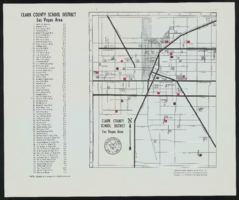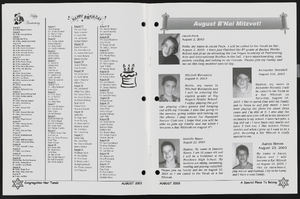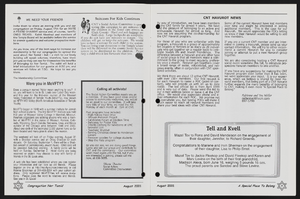Search the Special Collections and Archives Portal
Search Results

Mabel Hoggard: teaching materials
Date
Archival Collection
Description
Folder of materials from the Mabel Hoggard Papers (MS-00565) -- Educational work and legacy file. This folder includes teaching contracts, a Clark County School District Las Vegas Area map, teacher-student guidelines, newsletters, a conference booklet, a speech transcript, and other documents related to Mabel Hoggard's teaching career.
Mixed Content

Transcript of interview with Lee Cagley by Claytee D. White and Stefani Evans, August 08, 2016
Date
Archival Collection
Description
Lee Cagely, an interior designer and professor who designed some of the most iconic hotels in Las Vegas, Nevada, was born in the Panama Canal Zone on January 31, 1951. His father Leo was a civil engineer for the Panama Canal Company and his mother Charlotte worked as a receptionist. After his father left his job in Panama, Lee spent his childhood in Dallas, Texas; Tulsa, Oklahoma; and Des Moines, Iowa. He started to attend Rice University for architecture, but he chose to leave before completing his degree. He returned to college a few years later and graduated from Iowa State University with a degree in interior design in 1975. While his first California jobs were in restaurant design, he quickly moved on to airports and hotels and moved to Las Vegas in 1990 after associating with Marnell Architecture. Cagley is known for his designs in the Rio All-Suite Hotel and Casino, Ceasars Palace Atlantic City, the Mirage, and the Bellagio Resort & Casino. He is currently Chair of the Iowa State University College of Design and is principal designer for Lee Cagely Design. Here, Cagley explains the importance of keeping the various pieces of the infrastructure of a resort—including landscape architecture, architecture, interior design, all kinds of HVAC [heating, ventilation and air conditioning] concerns, housekeeping, food service, maintenance, etc.-invisible in order to maximize the visitor experience. At the same time he illustrates through several examples how resort design does not happen in a vacuum-it is instead part of a complex team that works together to create the whole. He also describes the challenges the Las Vegas resort industry finds in creating the very best visitor experience for a broad range of groups-from Millennials to their Boomer grandparents and all the generations in between.
Text

Transcript of interview with Betsy Fretwell by Claytee White and Stefani Evans, August 30, 2016
Date
Archival Collection
Description
Shortly before the University of Georgia granted Betsy Fretwell Master's degree in public administration in 1991, she applied for a one-year internship with Clark County, Nevada. The County hired her, but Fretwell did not complete her internship. Instead, the County promoted her, hired her full-time, and soon had her lobbying for the County's interests in Carson City. Her insistence on learning all sides of a question and communicating that knowledge to the decision makers was one of the skills that made her so valuable to Clark County administrators. In this interview, Fretwell discusses her South Carolina childhood, her affinity for the University of Georgia Bulldogs, and the path she took to occupy the office of city manager for the City of Las Vegas. She talks about her years at Clark County and a term at the City of Henderson, but she mostly focuses on her sixteen years at the City of Las Vegas, first as assistant city manager under Virginia Valentine and later as city manage
Text

Transcript of interview with Roger Thomas by Stefani Evans and Claytee D. White, August 31, 2016
Date
Archival Collection
Description
As he reveals in this oral history, Roger Thomas is, among many other things, a son, a father, a brother, a husband, a student, an artist, a visionary, and a philanthropist. As the second son of Peggy and E. Parry Thomas’s five children, Roger was raised a Mormon child of privilege and civic responsibility. The banking family summered in Newport Beach, wintered in Sun Valley, and taught their children by words and deeds that it is not up for debate if you will be involved in your community; the only question is how you will apply your talents and resources to benefit your community. Roger absorbed the lessons well. As a child who struggled in school but excelled in art, he attended his last two years of high school at Interlochen Arts Academy, graduating in 1969, finally finding himself “in an environment where what I did had currency.” From there he earned his BFA from the School of the Museum of Fine Arts Boston and Studio Degree from Tufts University before returning to Las Vegas and eventually joining Steve Wynn’s team in 1981. As Executive Vice President of Design for Wynn Design & Development, he is the man in whom Steve Wynn places his trust to make real at each Wynn property the Wynn design philosophy: aim for a constituency of highly sophisticated, well-traveled, very educated people and give them a reality, a now, that is so fetching, so alluring they wish to be no place else. As he was mentored by his father and Steve Wynn, he too is mentoring those who will follow him. At Wynn, the next generation will carry forward the Wynn idea of evoca-texture, of creating “moments of experiential emotion that result in a memory so captivating and so unique that if you want to repeat that you have to come back.” At home, he collaborates with his daughter on a children’s book that has the potential to become a series; she is the illustrator, while he provides the words. Roger Thomas sat for this interview five days after his father, E. Parry Thomas, passed away in Idaho. Instead of postponing the interview to a more convenient time, Roger kept the appointment and explained, “This is for UNLV. If I’d cancelled my father would have killed me.”
Text

Transcript of interview with Bruce L. Woodbury by Stefani Evans, September 27, 2016
Date
Archival Collection
Description
As Bruce Woodbury reflects on his twenty-eight years as Clark County's longest-serving County commissioner (1981–2009) he recalls serving with about thirty different commissioners. Surprisingly, "only seven of us got major jail sentences." He ruminates how Federal Bureau of Investigation probes Operation Yobo in the early 1980s and G Sting in the early 2000s exposed several Clark County politicians who succumbed to greed. While Woodbury considers honesty in office a given, his values were not held by all of his colleagues. One Operation Yobo recording caught a fellow commissioner responding to the query, "How about Woodbury?" with, "No, you can't touch him with a ten foot pole." Woodbury remembers his "campaign guys really liked that." Apparently the voters did as well, as he consistently won re-election. The Las Vegas native, who was raised in the John S. Park neighborhood and attended Las Vegas schools, earned his Bachelor's degree at the University of Utah and his Juris Doctorat
Text

Harold McKay interview, March 13, 1981: transcript
Date
Archival Collection
Description
On March 13, 1981, Dana Jamerson interviewed Harold McKay (b. July 27th, 1903 in Dresden, Kansas) about his life as a teacher in Las Vegas, Nevada. McKay speaks about his education, his move from Chicago, Illinois to Las Vegas and how he began his career in education. McKay focuses on how and why he founded the Teacher’s Credit Union, his time working in administration and his business school, as well as the problems related to segregation and integration in the educational system. Lastly, he talks about the growth of the gaming and entertainment industry in Las Vegas, and his volunteer work with the Senior Citizen Center.
Text




